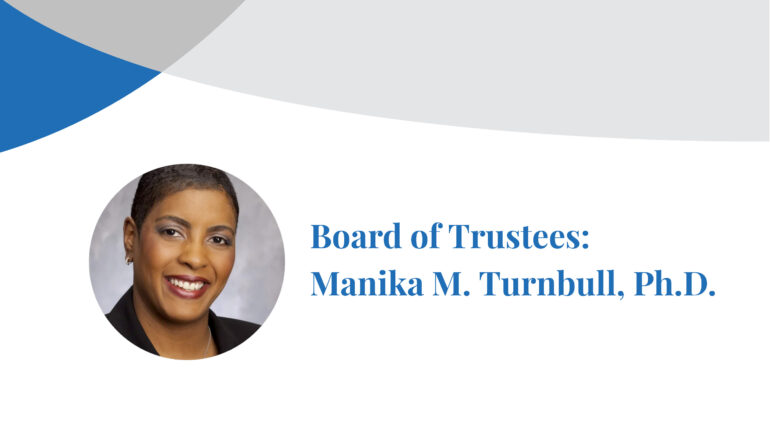Manika Turnbull, Ph.D., believes in the power of people. She knows what they’re capable of because she knows what she is capable of.
“I was born and raised in Pittsburgh. It’s a blue-collar city, and that’s a huge part of who I am,” Dr. Turnbull says. “My dad was a single father. He was an electrician, and he went to work every day while also taking care of three kids. He taught us to have grit. He used to say, ‘The easiest thing to find is an excuse, and we don’t make excuses here. We just go get it done.’ So that’s been my mantra my whole life: No excuses.”
Something else Dr. Turnbull learned from her father was a love of sports. In fact, she ended up going to college on a full basketball scholarship. But she never intended to play professional ball. For her, basketball was a means to an end, and that end was a career in psychology.
“The reason my dad was a single father is because my parents got divorced. My mother has bipolar disorder, and in the African American community at that time, you did not talk whatsoever about mental health disorders. So it went undiagnosed and untreated for a really long time, and my dad made the decision that he wasn’t going to put his kids through that,” continues Dr. Turnbull, who began quietly researching bipolar disorder at age 10 in an attempt to understand it. Deciding that she wanted to help families like hers, she pursued a career in clinical psychology.
Ultimately, Dr. Turnbull took a different path. After getting a bachelor’s degree in psychology from James Madison University in Virginia, Dr. Turnbull earned her master’s degree in industrial and organizational (I/O) psychology from The Chicago School, where she also earned a doctorate in organizational leadership with an emphasis on servant leadership and emotional intelligence. Simultaneously, she started an 18-year career at Health Care Service Corporation (HCSC), which operates as Blue Cross and Blue Shield in Illinois, Montana, New Mexico, Oklahoma, and Texas. She started as a unit manager in learning and development and is now senior vice president and chief human resources officer.
“When you’re talking about psychology, you’re talking about healing people. I see my role as helping to heal organizations,” explains Dr. Turnbull, whose modus operandi is making employees happier so they can be more productive. “Take COVID. When COVID hit, I had to ask myself what I could bring to bear in terms of my knowledge and my skill set to support our organization. What could we do to keep our workforce engaged during this trying time? Because unless we have fully attentive employees, we can’t be our best selves to help our customers get through the unimaginable.”
Helping people overcome the unimaginable is as much HCSC’s mission as it is Dr. Turnbull’s. “Our purpose as an organization is to do everything within our power to stand with our members in sickness and in health, and that’s what brought me here,” continues Dr. Turnbull, who feels a similar kinship with The Chicago School, on whose Board of Trustees she has served since 2014. “Providing service to the board was a calling to me. This is an institution that set me on my path, so I want to give all that I can back to it.”
One of the ways she’s most proud to support her alma mater is by hiring fellow alumni. “I’ve been able to employ several graduates of The Chicago School, and I think that says a lot,” Dr. Turnbull says. “As a trustee and a proud alum, it means a lot to be able to do for others what the school has done for me, providing them a solid career path in a strong company where I know there are opportunities available.”
It’s especially meaningful when Dr. Turnbull considers the path she’s taken. “When I was getting my bachelor’s degree, someone once asked me, ‘What are you majoring in?’ And when I said psychology, the person literally laughed in my face. ‘Good luck,’ they said. ‘You’ll never go anywhere with that degree,’” she recalls. “I decided to work even harder and when I found The Chicago School, I realized all the various avenues that were open to me. What I learned studying psychology is what has made me successful in every job I’ve had.”
In that way, Dr. Turnbull likens herself and others like her to seeds in a garden. “If you take a seed and you plant it, give it light and give it water, it eventually grows into a flower,” she says. “That’s what The Chicago School represents to me. It gave me the right environment to grow in.”

